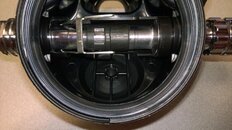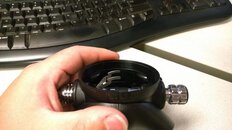DukeAMO
Contributor
There are some people who are just not cut out for diving. A good friend of mine married an avid diver and tried sitting in their backyard pool in his gear many times, but could never get over feeling like she wasn't getting enough air, or feeling like the regulator didn't fit or wasn't working. She eventually gave up, and I respect her decision.
On the other hand, I was anxious for many of my early dives, especially the OW checkout dives, and I still get tense before dives (but not as much as I used to). That's just my personality, I think. I feel the same way before diving as I do before running a race or getting on a roller coaster. I'm also stubborn and persistent, so I kept working at it. Once I get 15 feet under, get my ears cleared, get neutrally buoyant, and get my gear adjusted comfortably, then I relax and I'm happy. By the end of the dive I usually don't want to get out!
My point is, you can overcome anxiety by getting training to do the right thing, and doing it over and over, so you are confident in your ability to handle the situation. However, if you give diving a couple of tries and still don't like it, it's ok to just walk away. You could get good at snorkeling or freediving first. You can always try diving again someday, if you want.
On the other hand, I was anxious for many of my early dives, especially the OW checkout dives, and I still get tense before dives (but not as much as I used to). That's just my personality, I think. I feel the same way before diving as I do before running a race or getting on a roller coaster. I'm also stubborn and persistent, so I kept working at it. Once I get 15 feet under, get my ears cleared, get neutrally buoyant, and get my gear adjusted comfortably, then I relax and I'm happy. By the end of the dive I usually don't want to get out!
My point is, you can overcome anxiety by getting training to do the right thing, and doing it over and over, so you are confident in your ability to handle the situation. However, if you give diving a couple of tries and still don't like it, it's ok to just walk away. You could get good at snorkeling or freediving first. You can always try diving again someday, if you want.






